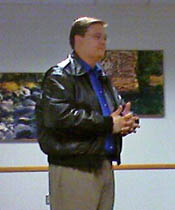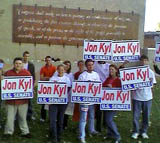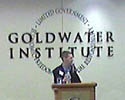|

|
|
|
|

|
|
Friday,
October 13, 2006
 Rhymes
with Salsa - In
yesterday's local paper was an essay/commentary by an NAU freshman
named Katie Eubanks. Based on this sample, it would seem she may
well have a promising future in the writing business. I can only
lament that my students don't write half as clearly as Ms.
Eubanks. Still, what attracted my attention was the opening
paragraph: Rhymes
with Salsa - In
yesterday's local paper was an essay/commentary by an NAU freshman
named Katie Eubanks. Based on this sample, it would seem she may
well have a promising future in the writing business. I can only
lament that my students don't write half as clearly as Ms.
Eubanks. Still, what attracted my attention was the opening
paragraph:
| "Vote
for Khalsa - Rhymes with Salsa!" When I saw this
sign sticking out of the ground, I laughed. Were all
local politicians as much fun as Khalsa? I'd never seen
campaign slogans like this, at least not where I came from. |
I chuckled when I read that, but not because
it is funny. Rather, it struck me as sadly ironic. Avtar
Khalsa's campaign for Justice of the Peace seemed rooted in racism,
focused on the slogan that Ms. Eubanks remarked upon. As one
would surmise, he is not Hispanic. Yet, his major argument for
garnering votes was that his name sounded vaguely Spanish and, indeed,
rhymed with a well known word. Who the heck cares what his name
rhymes with? The subtext here is clear ... well, at least to
anyone not a freshman in college - "Vote for me because I'm one
of you!" Political ideologies don't matter. Issues
don't matter. Views about the proper role of the judiciary don't
matter. All that matters is that my name rhymes with salsa, and
there are many Hispanic voters in our area, and there is no better
basis upon which to base your vote. Besides, it's fun!
No, it is not fun. It is brainless and it should be loathed.
When campaigns turn on snappy slogans that are nothing but a base
appeal to ethnic identity, it should be clear to everyone that
politics is rotten to the core. I can't help but think, that, if
Ms. Eubanks found this example "fun" whether she would
really get the irony of this Mel Brooks' line from The
Producers - "Don't be stupid, be a smarty / Come and join the Nazi Party!"
Maybe she would have written, "What a hoot!"
|
|

|
|
Wednesday,
October 18, 2006
  Automated
Hotel Check-In
- This past weekend, my wife and I were off to Las Vegas for
about 24 hours. I was presenting a paper at a
conference
being held there - Round Two of the Canyon Forest Village Debate:
One Step Forward, Two Steps Back. It is an interesting
story of the abject failure of public sector decision making.
Well, I Automated
Hotel Check-In
- This past weekend, my wife and I were off to Las Vegas for
about 24 hours. I was presenting a paper at a
conference
being held there - Round Two of the Canyon Forest Village Debate:
One Step Forward, Two Steps Back. It is an interesting
story of the abject failure of public sector decision making.
Well, I  think
it is an interesting story. We arrived late Sunday afternoon,
went to the play Mama Mia, and
caught the last performance out in front of the Treasure
Island (pictured to the right). Right next door to our hotel
(the so-called "New" Frontier) was the Trump
International Tower, still under construction. The photo, to
the left, was from our room. For the second time in a row, I
have been to Las Vegas and haven't bet a single dime. There just
was too much to do to be able to include any playing of cards!
How's that for irony? think
it is an interesting story. We arrived late Sunday afternoon,
went to the play Mama Mia, and
caught the last performance out in front of the Treasure
Island (pictured to the right). Right next door to our hotel
(the so-called "New" Frontier) was the Trump
International Tower, still under construction. The photo, to
the left, was from our room. For the second time in a row, I
have been to Las Vegas and haven't bet a single dime. There just
was too much to do to be able to include any playing of cards!
How's that for irony?
The point of my story, however, is that we had to wait a long time in
the registration line, even though we were only the fourth ones
waiting, and there were two clerks. What a waste of time.
This was especially so, because we didn't think that our check-in
would take much time to process - we had paid in advance.
So, we invented the automated hotel check-in machine, at least in our
heads, while waiting. Here's how it would work:
 Kiosks with
touch screen monitors.
Patterned after airport check-ins,
you would stand at these kiosks, swipe a credit card to prove who
you were and check-in.
Kiosks with
touch screen monitors.
Patterned after airport check-ins,
you would stand at these kiosks, swipe a credit card to prove who
you were and check-in.
 Keep the menu
options simple.
While the main purpose would be to
check-in for an already confirmed room, there could be a limited
menu of options that would accommodate a slightly more complicated
transaction.
Keep the menu
options simple.
While the main purpose would be to
check-in for an already confirmed room, there could be a limited
menu of options that would accommodate a slightly more complicated
transaction.
 Keys can be
encoded and dispensed at the kiosk.
The reason this automated check-in
works is because all the keys, these days, are just electronically
encoded to the rooms. So, this can be done in the machine, on
a blank set of keys, and, presto, you have your room keys. A
hotel map, on the screen, can direct you to your room.
Keys can be
encoded and dispensed at the kiosk.
The reason this automated check-in
works is because all the keys, these days, are just electronically
encoded to the rooms. So, this can be done in the machine, on
a blank set of keys, and, presto, you have your room keys. A
hotel map, on the screen, can direct you to your room.
 Use these AHCs
for check-out as well.
If a printer is
included in the kiosk unit, you can check-out, deposit your keys,
review your bill and get a printed receipt.
Use these AHCs
for check-out as well.
If a printer is
included in the kiosk unit, you can check-out, deposit your keys,
review your bill and get a printed receipt.
 These machines
can be dispersed throughout the hotel.
There is no longer a need for a
centralized location for the check-in, so guests can check-in at the
entrance near to wherever they park. And, the convenience for
check-out, is also enhanced by dispersed placement. Unlike the
airline model, where you need to drop off your bags, in the hotel
there is no special need to have these kiosks centrally located.
These machines
can be dispersed throughout the hotel.
There is no longer a need for a
centralized location for the check-in, so guests can check-in at the
entrance near to wherever they park. And, the convenience for
check-out, is also enhanced by dispersed placement. Unlike the
airline model, where you need to drop off your bags, in the hotel
there is no special need to have these kiosks centrally located.
It all makes sense to me. I don't really see a downside. I
wouldn't be surprised to see something like this very soon. Do
you think I'll make any money off of it? Probably not - you
can't patent ideas.
|
|

|
|
Wednesday,
October 18, 2006
  In
Tune with Dean Martin
- As part of a whirlwind trip around much of Arizona yesterday,
State Treasurer candidate
Dean
Martin
spoke to the College Republicans at Northern Arizona
University. He had traveled to Prescott for a breakfast meeting,
then up to Bullhead City for a luncheon, then over to Kingman to
do a talk radio show, and, finally, to Flagstaff to speak to the CRs.
That meeting wrapped up at about 8:00 p.m., and he still had to make
the long drive to Phoenix before his day was done. In
Tune with Dean Martin
- As part of a whirlwind trip around much of Arizona yesterday,
State Treasurer candidate
Dean
Martin
spoke to the College Republicans at Northern Arizona
University. He had traveled to Prescott for a breakfast meeting,
then up to Bullhead City for a luncheon, then over to Kingman to
do a talk radio show, and, finally, to Flagstaff to speak to the CRs.
That meeting wrapped up at about 8:00 p.m., and he still had to make
the long drive to Phoenix before his day was done.
Mr. Martin is currently a state senator, and a favorite of the folks
over at the Arizona
Federation of Taxpayers. [Surf on over to their site for an
excellent analysis of the propositions on the Arizona ballot this
November.] He has been a tireless champion of the taxpayer and
an articulate spokesman for using common sense in government (a much more
difficult task than one might expect!).
Mr. Martin spoke on some of the ballot propositions that he felt were
important in the upcoming election. This was especially true of
Prop 101, which would prohibit counties from automatically raising
property taxes during times of rising home valuations. That is,
if the rate stays constant, rising valuations will lead to larger tax
bills and more tax revenue. This proposition would require an
explicit vote in order to raise tax revenues in this way.
Vote
yes on Prop 101.
Insofar as running for Treasurer, Martin
argued that the state was doing a poor job of maximizing its return
on taxpayer monies, as well as the earnings on state trust revenues
(which are used, primarily, to fund education). He also wants
to be able to use that office to help generate public policy
analysis on financial decisions that are constantly under
consideration by the state. He feels that this can be a great
help in continuing his efforts to protect taxpayers from the
ever-widening tentacles of government.
It appears that Martin has a good chance of winning this election, and
it may well be that he will be, effectively, the ranking Republican in
a state office. [Technically, the Secretary of State is probably
ranked higher.] Yes, that means Napolitano, and Goddard, will
likely be re-elected. So, for the next four years, it may well
be that Dean Martin is the face of the state Republican party.
And, in four years . . . ? Hmm; keep your fingers crossed.
|
|

|
|
Sunday,
October 22, 2006
  Ross
Perot Redux Lite
- This past Friday evening saw Flagstaff hosting the final debate
between U.S. Senator
Jon Kyl
(R)
and challenger
Jim Pederson
(D). The debate was held in the Communications Building on the
campus of Northern Arizona University. Showing up, to show their
support for the incumbent, were students from the College
Republicans. [Also, there was a group there to support Pederson,
but only a small fraction appeared to be NAU students.] Signs
were waved, cheers were made, and the local press took pictures.
The debate was not open to the public, so shortly before its start,
everyone left to watch it on TV. Ross
Perot Redux Lite
- This past Friday evening saw Flagstaff hosting the final debate
between U.S. Senator
Jon Kyl
(R)
and challenger
Jim Pederson
(D). The debate was held in the Communications Building on the
campus of Northern Arizona University. Showing up, to show their
support for the incumbent, were students from the College
Republicans. [Also, there was a group there to support Pederson,
but only a small fraction appeared to be NAU students.] Signs
were waved, cheers were made, and the local press took pictures.
The debate was not open to the public, so shortly before its start,
everyone left to watch it on TV.
I have seen Pederson only in his TV ads. I can't say that I was
impressed - his rhetoric is the usual hollow nonsense. And, in
an ad you hardly have a chance to say much, so I was interested to see
how this forum would allow the candidates to convey their stands and
beliefs. I have seen,
and met, Kyl before. He has won my respect and admiration as a
straight shooter - he tells you what he thinks and why he thinks it.
And, what of Pederson? Listening to him reminded me of another
nut job - one H.
Ross Perot. Like the crazed businessman from Texas, Pederson
seems to have little understanding of how the world works; or, perhaps
more appropriately, thinks the world should work just like his
business. During the debate, these three episodes captured the
lunacy of this candidate that makes him seem like a mini-me version of
Perot:
 If Defense
Secretary Rumsfeld worked for him, he'd be fired.
Pathological in the extreme. Rummy
has more smarts in his little finger than Pederson has in his whole
staff. I find criticisms of the Def Sec to come mostly from
the intellectually challenged, but Pederson assumes a fact not in
evidence - would Rumsfeld ever have worked for such a nitwit as Jim
Pederson? I don't think so.
If Defense
Secretary Rumsfeld worked for him, he'd be fired.
Pathological in the extreme. Rummy
has more smarts in his little finger than Pederson has in his whole
staff. I find criticisms of the Def Sec to come mostly from
the intellectually challenged, but Pederson assumes a fact not in
evidence - would Rumsfeld ever have worked for such a nitwit as Jim
Pederson? I don't think so.
 Pederson's shock
that the vested parties in the Snowbowl controversy can't just work
out their differences.
Well, lets change that from pathological to psychotic. He must
not know anything about this issue, which surprises me. After
all, he clearly doesn't know anything about national defense, about
the war on terror, about immigration. So, I figure that he must
know something about some issue. Maybe, but this one isn't
it. Senator Kyl went through the litany of meetings and hearings
and, eventually, a court case to decide this issue. And, guess
what? The opponents are still opposed! And, Pederson thinks
he can solve everything by just getting people into a room to hash out
their differences.
Pederson's shock
that the vested parties in the Snowbowl controversy can't just work
out their differences.
Well, lets change that from pathological to psychotic. He must
not know anything about this issue, which surprises me. After
all, he clearly doesn't know anything about national defense, about
the war on terror, about immigration. So, I figure that he must
know something about some issue. Maybe, but this one isn't
it. Senator Kyl went through the litany of meetings and hearings
and, eventually, a court case to decide this issue. And, guess
what? The opponents are still opposed! And, Pederson thinks
he can solve everything by just getting people into a room to hash out
their differences.
 He blamed Kyl
for everything except global warming.
But, I am sure that is next! Midway through the debate, Kyl just
looked down at the desk, spread out his hands and lamented that every
ill in the world, according to Pederson, was his personal fault.
Pederson treated Kyl as if he were the Supreme Ruler of all the Known
Universe, instead of one politician among many. I think we can
file Pederson away in the folder labeled, "Deranged."
He blamed Kyl
for everything except global warming.
But, I am sure that is next! Midway through the debate, Kyl just
looked down at the desk, spread out his hands and lamented that every
ill in the world, according to Pederson, was his personal fault.
Pederson treated Kyl as if he were the Supreme Ruler of all the Known
Universe, instead of one politician among many. I think we can
file Pederson away in the folder labeled, "Deranged."
The Pederson supporters outside the debate were chanting, "We
want Pederson; we want change." As best I can tell, that's
about all he really offers.
|
|

|
|
Saturday,
October 28, 2006
  Buck
Wild in Phoenix Buck
Wild in Phoenix - Last Thursday evening,
Steve
Slivinski
was being hosted for an informal talk at the
Goldwater
Institute, in Phoenix, Arizona. Steve is out and about
promoting his new book, Buck Wild: How Republicans Broke the Bank
and Became the Party of Big Government. Steve used to be a
policy analyst at the Goldwater Institute, and is now the Director of
Budget Studies at the Cato Institute.
- Last Thursday evening,
Steve
Slivinski
was being hosted for an informal talk at the
Goldwater
Institute, in Phoenix, Arizona. Steve is out and about
promoting his new book, Buck Wild: How Republicans Broke the Bank
and Became the Party of Big Government. Steve used to be a
policy analyst at the Goldwater Institute, and is now the Director of
Budget Studies at the Cato Institute.
The thesis of the book, and the subject of Slivinski's talk, is that
this Republican Administration has been a disaster insofar as adhering
to the principle of a limited government and a commitment to shrinking
the size of government. Even discounting funds used for the
"war on terror," President Bush, and company, have managed
to grow the government at about the same rate as did President
Johnson, in the 1960s, and President Carter, in the 1970s. In
all three cases, we had a unified government - the same party
controlled both houses of Congress and the presidency. Slivinski
suggested that it has been difficult for Bush to veto spending bills
that are coming out of a Congress controlled by his party, but that he
likely would have vetoed plenty of bills if the Dems had been in
charge.
Slivinski concluded that, for those that believe in a limited
government, we are better served by a divided government.
"Gridlock works," Slivinski opined. Consequently, it
may be more fortuitous for conservatives if, indeed, the GOP loses
control of the House of Representatives this fall, as many experts are
forecasting. At least then, not much will get done for the next
two years.
Following his 20-30 minute talk, the floor was opened for
Q&A. The questions posed were smart and well articulated by
the guests in the crowd. One questioner wondered what it really
means to be a Republican. Slivinski answered that about all it
means is that "you're not the other guy." He did
suggest that the Reagan Revolution, in the eyes of some, was really an
anomaly. That is, plenty of Republicans before Reagan, and
since, have extended and expanded the role of big government.
While another questioner asked, "Are we really just arguing about
how quickly, or slowly, we will become socialists?" Slivinski
wasn't quite prepared to throw in the towel, yet. There
are still plenty of elected Republicans that will do more than
give lip service to the tenets of limited government, including
Arizona Congressmen Jeff Flake
and John Shadegg.
|
|

|
|
Monday,
October 30, 2006
 Minimum
Wages as Fantasy
- The Sunday edition of the Arizona Daily Sun ran an editorial I
penned on the minimum wage, which will rise if proposition 202 passes
next week. The editor paired it up with an editorial in favor of
the this proposition. I was gratified that the editor found the
issue of enough interest to run it in the Sunday paper. The
printed editorial appears to be unchanged from the version I sent,
which I have printed below. Minimum
Wages as Fantasy
- The Sunday edition of the Arizona Daily Sun ran an editorial I
penned on the minimum wage, which will rise if proposition 202 passes
next week. The editor paired it up with an editorial in favor of
the this proposition. I was gratified that the editor found the
issue of enough interest to run it in the Sunday paper. The
printed editorial appears to be unchanged from the version I sent,
which I have printed below.
|
The
Minimum Wage Ė A Dangerous Fantasy
Dennis Foster
Proposition
202 seeks to raise the minimum wage in Arizona, and to keep
raising it automatically with cost of living adjustments.
Proponents generally argue that working full time, at the
minimum wage, makes it impossible to support a family above
the poverty line. Certainly, that is true.
However, that is not the circumstance faced by most minimum
wage workers.
Are
minimum wage workers working full time? No, most work
part time. Seventy-five percent work less than 35 hours
a week, with nearly a third of these workers putting in
between 20 to 24 hours a week.
Are
minimum wage workers supporting a family? No.
Nearly seventy percent of these workers have never been
married. Almost sixty percent of these workers are
between the ages of 16 and 24, with nearly two-thirds of these
workers under twenty years old.
Why do
minimum wage workers have such low earning power? Since
most are young, they likely have little experience and few
developed skills. Also, these workers tend to have less
education than other, higher earning, workers. Over 44
percent of minimum wage workers donít have a high school
diploma, while an additional 27 percent have such a diploma,
but no college education.
Will these
workers be forever stuck in minimum wage jobs? Of course
not. Even with educational shortfalls, they will, over
time, gain experience and skills. They will find that
the value of their labor is rising over time, and so, too,
will their earnings. The circumstances of a minimum wage
job are not endemic for the vast majority of these workers.
So, one
problem with raising the minimum wage is that it is an
extraordinarily wasteful and inefficient way to address the
problems of just a small faction of these workers. A
second problem is that it creates barriers to those that we
most want to enter into the labor force.
Since
1982, the proportion of all paid workers that earned just the
minimum wage has fallen from about 5 percent to about 0.4
percent. As long as that isnít due to further
distortions of labor markets, that is a good thing. Why?
Because, it means that the minimum wage is less and less
relevant as market wages rise over time, lessening the
distortions it creates in certain labor markets.
However,
raising the minimum wage will lead to rising unemployment in
sectors of our economy where this is higher than the
otherwise, freely-determined, market wage. And, who will
suffer from these unemployment consequences? Those who
are poor and unskilled, with little experience and education,
those who are young, and those who are minorities.
Consider that the unemployment rate among black teens, 16 to
19 years old, peaked at over 50 percent in 1982. As the
minimum wage has become less and less relevant, this
unemployment rate has fallen to about 30 percent. A
travesty still, to be sure, but what do you think will happen
if the minimum wage rises? This unemployment rate will
rise along with it.
Raising
minimum wages doesnít affect the skilled, the experienced,
or the educated. It raises the bar to those trying to
get their start in life, making it all the more difficult for
them to succeed. Some say that this is a moral issue.
I couldnít agree more. The government canít tell you
what to read, how to think, nor to whom to pray. Neither
should the government proscribe oneís willingness to offer,
and anotherís willingness to accept, any wage rate. To
hold otherwise is to deny life, liberty, and the pursuit of
happiness.
|
The
Saturday paper had a story about the minimum wage proposition and it
touched on a point that I wasn't able to make in my editorial, due
to space constraints. The story was about some NAU students
and how they might fare under the new, higher minimum wage.
There really aren't many minimum wage workers in Flagstaff.
The local Taco Bell actually has a large banner, periodically posted
in their window, that proclaims "Jobs starting at $7/hour."
Likewise, I recently noticed a sign, posted at the drive-thru of a
local Burger King, that also was soliciting workers at $7 per hour.
These are exactly the kinds of jobs we associate with minimum wages
(35% of all minimum wage workers are classified as employed in "food
preparation and serving"). Yet, local market conditions have
raised this wage well above the minimum.
My suspicion is that most local minimum wage workers are students at
NAU, working for the university in a wide variety of jobs. I
"employ" a grader for my classes, for only 3+ hours a week,
and that is at the minimum wage. The money for these jobs is
tightly budgeted through the college and the university. If the
minimum wage goes up, I seriously doubt that the university will get
more money to pay these student-workers. Instead, we'll just
have to hire fewer of them, for fewer hours. I'll likely have to
do more grading myself (of the type that isn't subjective), which
probably means I'll have fewer graded assignments. Somehow, I am
not under the impression that these are the kinds of results that most
voters would consider when casting their ballots next week.
|
|

|
|

|

|

|

|

|